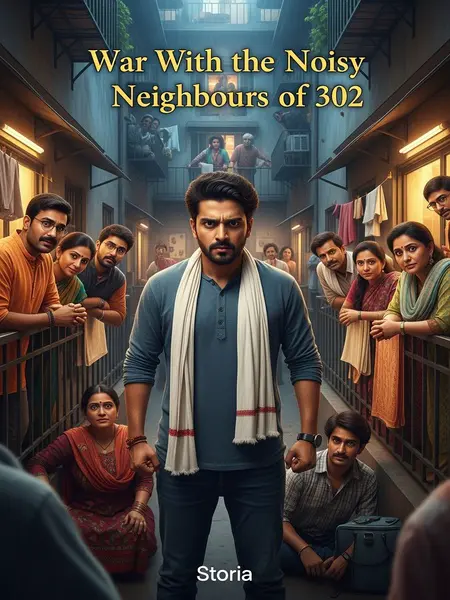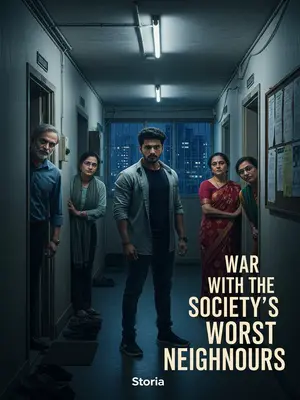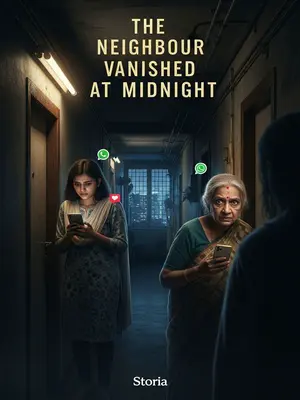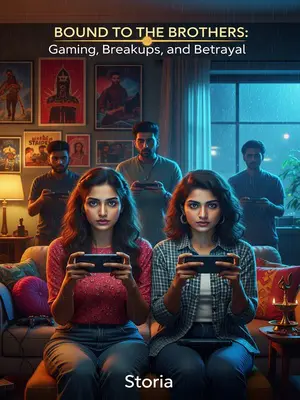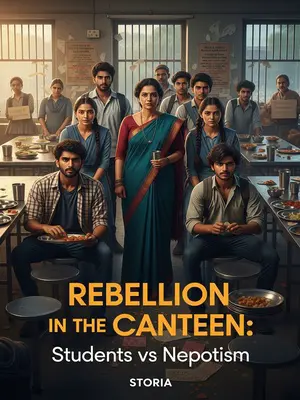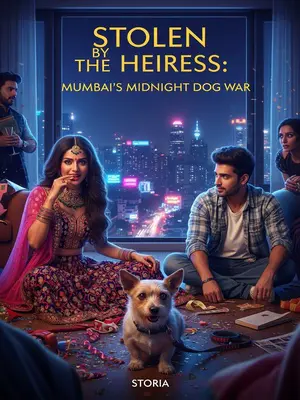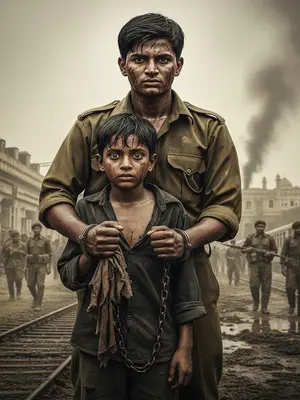Chapter 5: The Garbage Gambit
I slept till noon the next day. Ordered biryani on Swiggy, settled at my desk to write a new chapter. The smell of fried onions and masala filled my flat. My stomach rumbled; even the Delhi sun outside seemed less harsh.
Half an hour later, my phone rang.
Who could it be? I rarely get calls—unless it’s my mother or a random bank rep.
I was confused. I always leave a note for deliveries—“Gate par rakh do, bhaiya.” But this time, something was off.
“Bhaiya, can you come out and get your food, or should I leave it downstairs?”
The delivery boy sounded nervous, as if he’d seen a ghost.
I asked, “Why can’t you leave it at the door?”
He hesitated, voice dropping. “Sir, maybe you should come and see…”
"Maybe... you should come take a look?"
There was an edge in his voice, the kind that says, “Bas, ab toh dekhlo.”
I opened the door—and got smacked in the face by a wave of stench.
It was so strong, I staggered back, eyes watering. Flies buzzed around, celebrating.
There were several big bags of garbage at my feet, yellow-green liquid oozing everywhere. My brand-new Bata chappals were a lost cause.
There was nowhere to step.
Even the lizard on the wall looked disgusted and scuttled away.
Didn’t even need to think—I knew who did it.
My anger flared. Delhi traffic rage was nothing compared to this.
For a second, I heard my mother’s voice—“Beta, yeh sab theek hai?”—but I shoved the thought aside. Some battles, you just have to fight.
So, I marched to the neighbour’s door, unbuckled my belt.
No hesitation. I was done being nice.
And performed a spectacular water magic show right on their door.
The sound echoed down the corridor, a symphony of rebellion. For a second, I felt like the hero in a desi revenge drama—justice, Delhi-style.
The yellow, murky urine splashed down, making a passionate sound.
If there was an Olympic event for creative retaliation, I’d win gold.
It felt like my DNA was vibrating in my bones.
There was a primal satisfaction—the kind you get after beating the colony bullies at street cricket.
A scene flashed in my mind: twenty thousand years ago, on the Ganga’s banks, our Homo sapiens ancestors dragged meat to their cave. The stench attracted predators—red eyes in the dark.
A few strong men stepped out, unleashed a mighty stream of piss at the entrance, claiming their territory.
It’s the original desi solution—mark your spot, dare anyone to challenge you.
The testosterone overpowered the scent of blood. The beasts hesitated, then slunk away.
Half awake, half dreaming, I imagined my ancestors giving me a thumbs-up. A nod from my genes. What a satisfying release.
Even the delivery boy stared, lips parted, as if watching a holy ritual.
I invited him to join in, “Bhai, aaj tum bhi kar lo. Life mein kabhi na kabhi mauka milta hai!” But he just shook his head, grinning in disbelief.
Unfortunately, he was still shackled by decency, unable to break free.
His face said, “Main toh seedha aadmi hoon, bhai.” He backed away, clutching his Swiggy bag tight.
I just smiled, then went downstairs to buy a wall scraper.
Time for some proper desi jugaad. The hardware uncle winked, “Problem ho gaya kya, beta?” I just nodded, too tired to explain.
On my way back, I was stopped by an old man.
He was perched on the stairs, gamcha over his knees, glasses thick but eyes sharp.
“Beta, you argued with 302 last night, didn’t you?”
I nodded.
He sighed. “You just moved here, you don’t know the situation. That family’s trouble—avoid them if you can.”
He rubbed his knees, voice heavy. “Yahan sab unse pareshan hain. Best not to get involved.”
I laughed. “Why be so scared? It’s not like they’re some local MLA.”
He shook his head, muttering, “Goondas come in all sizes, beta.”
“Their whole family are goondas, you can’t mess with them,” the old man said. “I live right below them. They keep me up every night. I’ve called the cops, talked to the society president—nothing works. They even throw cigarette butts onto my balcony.”
He pointed at a burn mark on his faded kurta. “Dekho, yeh naya hole hai. Every week, one more.”
Other neighbours gathered around:
Word spreads fast in our colony. Soon, a mini-panchayat formed, everyone eager to share their woes.
“I live on the ground floor. Had a mango tree—tended it for years, just about to fruit. Their kid climbed over, picked them all. The tree wasn’t much, but it was my hard work. I went to their parents—they flipped it, said their kid got diarrhoea from my mangoes and wanted me to pay medical bills.”
The aunty wiped her eyes, voice trembling. Her husband added, “Beta, mango tree toh gaya, ab toh gulab bhi nahi ugte.”
“They throw garbage downstairs, too. I got splashed with dirty water on my way to work once.”
A young man in office clothes nodded. “White shirt tha, pura khatam. Boss bola, ‘New fashion?’”
“They took over the colony badminton court to dry their quilts—unreasonable!”
Another aunty muttered about 'bad vibes' affecting her tulsi plant, and a kid complained, “Ab cricket kaun khelega?”
“They even stole my parking spot.”
A chorus of “Haan haan, sahi kaha!” rippled around.
It felt like a mini-panchayat, everyone finally unburdening themselves.
Turns out, they’re just bullies who prey on decent folks.
In every colony, there’s always one family that thinks the rules don’t apply. Ours just happens to quack the loudest.
The more I heard, the more fired up I got.
If not me, then who? I could feel my blood boil—an avenger in chappals, ready to fight.
If they’re that rotten, I have no moral qualms at all.
In my heart, I heard my grandmother say, “Beta, kabhi galat ke saamne mat jhuko.”
I set up a WhatsApp group on the spot—“302 Bachao Sena”—told everyone to add all the victims. “Who’s got the next plan?” “Bhai, main ready hoon!”
My phone buzzed with new messages. Even the secretary joined in, sending a thumbs-up emoji.
Humming, I went upstairs and dug through their trash. Most of it was kitchen slop—the stench made my eyes water.
The mixture was vile—leftover dal, spoiled milk, a lone brinjal. But I was on a mission.
I grabbed a mixer-grinder, pureed it into a sludge, and smeared it all over their door—even packed the keyhole tight.
The door was now a masterpiece of dark green goo, dripping everywhere. Swarms of flies buzzed over, rubbing their legs together like they were about to spark a fire. I figured they were saying, “Is this the legendary Happy Planet?”
I stepped back, admired my handiwork. The flies formed a welcoming committee, their wings humming in approval.
I checked the time—they’d be home in half an hour.
Perfect. Just enough time to clean up and set the stage for the next act.
Snapped a pic, posted it in the group chat.
Within seconds, “302 Bachao Sena” exploded. GIFs, memes, virtual claps. Even the old man sent a laughing emoji.
The group grew from a dozen to thirty people in no time.
Our building hadn’t seen this much unity since the last Diwali party.
As soon as the photo dropped, the chat blew up.
Everyone wanted in. The colony’s collective spirit was rising.
“What kind of interior design is this? Slop chic?”
One guy posted a modern art meme: “Inspired by Flat 302.”
“I can smell it through the screen—bro, you’re a legend.”
Aunty from 105 wrote, “Beta, mere taraf se ek rasgulla le lena!”
I said, “Neighbours, come over—good show’s about to start.”
Excitement was contagious. I heard slippers slapping as people hurried up the stairs.
Right after, I heard the sound of ducks coming up the stairs.
The familiar laughter, the slap of wet chappals, and then—
“Arrey, Mummy, come see!” Their kid yelled. “Someone smeared kachra all over our door!”
As the colony held its breath, I realized—this was just the beginning. The real war had only started.
Flat 302 had met its match. And the whole colony was watching, popcorn in hand.
